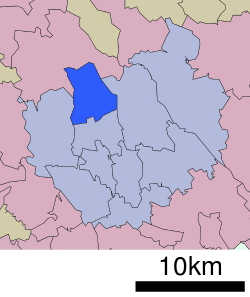Kita-ku, Saitama
Kita-ku (北区, Kita-ku) is one of ten wards of the city of Saitama, in Saitama Prefecture, Japan, and is located in the northwestern part of the city. As of 1 February 2016, the ward had an estimated population of 143,806 and a population density of 8530 persons per km². Its total area was 16.86 square kilometres (6.51 sq mi).
Kita-ku, Saitama 北区 | |
|---|---|
| Kita Ward | |
Kita Ward Office, Saitama City | |
 Location of Kita-ku in Saitama | |
 Kita-ku, Saitama | |
| Coordinates: 35°55′53.2″N 139°35′12.9″E | |
| Country | Japan |
| Region | Kantō |
| Prefecture | Saitama |
| City | Saitama |
| Area | |
| • Total | 16.86 km2 (6.51 sq mi) |
| Population (February 2016) | |
| • Total | 143,806 |
| • Density | 8,530/km2 (22,100/sq mi) |
| Time zone | UTC+9 (Japan Standard Time) |
| -Flower | Rapeseed |
| Phone number | 048-835-3156 |
| Address | 1-852-1 Miyahara-cho, Kita-ku, Saitama-shi, Saitama-ken 331-8586 |
| Website | www |
Geography
Kita-ward is located in the northwestern side of the city of Saitama.
History
The villages of Ōsato, Nisshin, and Miyahara were created within Kitaadachi District, Saitama with the establishment of the municipalities system on April 1, 1889. The three villages were merged with Ōmiya Town in 1940, becoming part of the city of Ōmiya. On May 1, 2001, Ōmiya merged with Urawa and Yono cities to form the new city of Saitama. When Saitama was proclaimed a designated city in 2003, the northwestern portion of former Ōmiya city consisting of the three former villages and a portion of the original Ōmiya village became Kita Ward.
Economy
A global automotive company, Calsonic Kansei, is headquartered in the ward.[1]
Education
Kita-ku has ten elementary schools, five middle schools, three high schools and two special education schools.
Transportation
Railway
- JR East – Takasaki Line
- JR East – Utsunomiya Line
- JR East – Kawagoe Line
- New Shuttle – Ina Line
- Kamonomiya - Higashi-Miyahara - Konba - Yoshinohara
Military facilities
- JGSDF Camp Ōmiya
- JGSDF Chemical School
Local attractions
The "Ōmiya Bonsai Village" (officially "Bonsai-chō" (盆栽町, lit. "Bonsai Town") was created after the 1923 Great Kantō earthquake when bonsai nurseries relocated from Tokyo to this area.[2]
- The Railway Museum is located on the border with Ōmiya-ku.
References
- "Company Profile." Calsonic Kansei. Retrieved on January 29, 2015.
- http://members.iinet.net.au/~jold/bia/country/japan/omiya.shtml Bonsai in Japan - Omiya Bonsai Village
External links
![]()
- Official website (in Japanese)